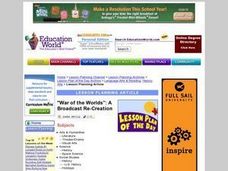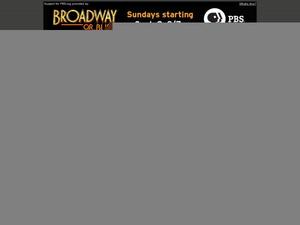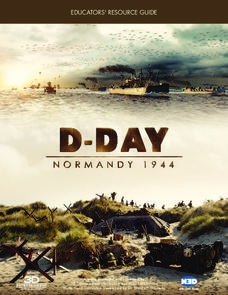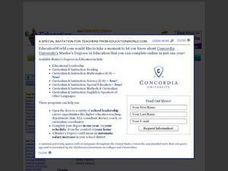Newseum
Use ‘War of the Worlds’ to Teach Media Literacy
Orson Welles' 1938 radio broadcast of "War of the Worlds" is the focus of a instructional activity that looks at the importance of clarity in broadcasting. After listening to the radio broadcast, class members discuss the ethical...
Curated OER
"War of the Worlds": A Broadcast Re-Creation
Why did Orson Welles' 1938 Broadcast of a adaptation of H.G. Wells' The War of the Worlds cause such a panic? To answer this question, class members listen to the original broadcast and research the panic that resulted. They then engage...
MCHS Early US History
Ken Burn’s Civil War, Episode 1: The Cause
Ken Burn's epic documentary miniseries The Civil War, broadcast in 1990, was the most-watched PBS program ever. A question sheet helps viewers keep track of events in the first episode of the documentary.
Curated OER
Macbeth News Broadcast
Here is an authentic assessment task for Shakespeare's Macbeth. Young literature scholars prepare, perform, and record a news broadcast about the major events in the play. For example, groups may choose to report on the death of Lady...
Rockefeller Archive Center
Understanding Mass Media News
In an age of fake news and photoshopped images, it is vital that 21st century learners development the skills they need to evaluate mass media and assess its validity. A great way to launch such a study is with a carefully crafted lesson...
Curated OER
World War II
Sixth graders read Under the Blood Red Sun (UBRS), V is for Victory (V), and Number the Stars(NS). They examine WWII through the eyes of Japanese, Danish, and American students and complete at least two projects: a radio broadcast and a...
Curated OER
Armadillo: Reporting on War
Point of view is everything, especially when reporting about the war in Afghanistan. Class members compare and contrast the same event from the war in Afghanistan as reported by five different sources. Learners are also asked to rank the...
Curated OER
Back to the Past
What was the Untied States like in 1938? What were the concerns of Americans in the post World War I era? What were their fears? What were their sources of news and entertainment? To understand the reaction to Orson Welles' radio...
PBS
Historical Perspectives: Coming Home from War
What do the homecoming experiences of soldiers who fought in WWII, Vietnam, Iraq, and Afghanistan reveal about the politics and culture of the US during the time period of each war? Young historians view The Way We Get By, which tells...
D-Day Normandy 1944
D-Day Normandy 1944
No study of World War II would be complete without an in-depth examination of the events of June 6, 1944. Pascal Vuong's D-Day Normandy:1944, is the perfect vehicle to convey the sheer magnitude of the events that have been called...
Curated OER
Freedom by the Fireside: The Legacy of FDR's "Four Freedoms" Speech
Middle schoolers read and analyze Franklin Delano Roosevelt's 1941 State of the Union Address. They listen to recordings of speeches by F.D.R., answer discussion questions, and participate in a debate.
Curated OER
The War of the Worlds
Students discover the concept of media based on literature. In this War of the Worlds instructional activity, students read the novel The War of the Worlds by H.G. Wells and listen to the 1938 radio broadcast adaptation by Orson Welles....
Curated OER
Creating a Newscast on the Cold War
Students research the events of a specific year of the Cold War. In this Cold War lesson, students investigate the causes of the Cold War and highlight the events of a particular year. Students create a...
Curated OER
Journalists Under Fire
Learners examine journalism in extreme conditions. In this war-zone journalism lesson, students research media coverage of Vietnam, Grenada, the Gulf War, and military actions in Somalia and Kosovo. Learners compare coverage in the...
Curated OER
A Movie in Your Mind: Persuasive Text
Students listen to a broadcast of War of the Worlds and illustrate what they hear. In this persuasive text instructional activity students prepare for making a movie poster intended to persuade a director to make a film based on a short...
Curated OER
Cold War Battle Grounds Arms Race, Space Race, Sports
Students explore the Space Race and Arms Race. In this Cold War lesson plan, students watch video clips and read information about how the Cold War was fought. Students complete a writing activity based on the information presented.
Smithsonian Institution
Mobilizing Children
Scholars find out how the government used propaganda to mobilize children to help in the war effort. Lesson exercises include analyzing a quote from Franklin Roosevelt, viewing propaganda images and posters, and participating in a lively...
DocsTeach
WWI Propaganda and Art
Uncle Sam wants you! During World War II, the US government and military created a propaganda campaign to gain public support. The activity uses primary documents such as photos to explain how and why the propaganda campaign was...
Newseum
Free Press Challenges Through History: Analyzing Historical Sources
The debate over the integrity of stories in media is not new. Young journalists analyze historical sources that reveal freedom of the press controversies and draw parallels to challenges freedom of the press faces today.
Curated OER
The History of Rock and Roll: Part 1 - Rock and Roll Explodes Music Reflects The Times
Learners examine technological advancements in music and broadcast over the decades.
Curated OER
Orchestrated Hell
Young scholars evaluate a radio broadcast by correspondent Edward R. Murrow as a primary historic source. The broadcast, popularly known as "Orchestrated Hell" recounts Murrow's experiences with a Royal Air Force bomber crew on a raid...
Curated OER
"And That's The Way It Is..." Today in History
Young scholars research an event in history from different perspectives. They discuss the characteristics of a nightly news broadcast and create their own based on the history event they researched. They work together to produce this...
Curated OER
Comparing the Satellite and Broadcast Radio Landscapes
Students research the development of satellite technology over the last 50 years students explain how the enactment of the Telecommunications Act of 1996 changed the rules for corporate ownership of multiple media outlets.
Curated OER
World War II Multimedia Newscast: History, Technology, Journalism
Students compose a multi-media newscast on various subjects relating to WWII to demonstrate their knowledge and ability to research.

























